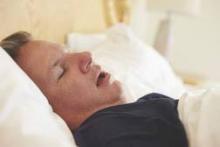Eight minutes of oropharyngeal exercises performed three times a day significantly reduced snoring, according to a report in the September issue of CHEST.
At 3 months, the snore index and the total snore index dropped significantly for the exercise group but not the control group, said Vanessa Ieto. Ph.D., of the Sleep Laboratory of the University of São Paulo in Brazil and her associates. The regimen improved snoring symptoms among primary snorers as well as patients with mild to moderate obstructive sleep apnea, although the apnea-hypopnea index only improved among patients with moderate OSA, the researchers added. “This set of oropharyngeal exercises is a promising treatment of large populations suffering from snoring who are currently largely ignored by the medical community,” they said.
Snoring is embarrassing and disruptive, and can exacerbate pharyngeal neurogenic lesions and carotid artery atherosclerosis, but few studies have objectively examined interventions for primary snorers or patients with mild OSA, the researchers said. In their randomized trial of 39 such patients, the intervention group performed six oropharyngeal exercises three times daily, while the control group patients practiced breathing exercises and wore nasal dilator strips at night. Both groups performed nasal lavage with saline solution three times a day. Average age was 46 years, and mean body-mass index was 28.2 kg/m2. A blinded researcher evaluated data from computerized polysomnography and a snoring recorder (Chest 2015;148:683-81). Nasopharyngeal exercises used in the study were as follows:
- Push tip of tongue against hard palate and slide tongue backward (20 times).
- Suck entire tongue up against palate (20 times).
- Force back of tongue against floor of mouth while touching tip of tongue to bottom incisors (20 times).
- Elevation soft palate and uvula while intermittently saying “A” (20 times).
- Place finger in mouth while pressing buccinator muscle outward (10 times per side).
- Chew and deglutinate on both sides of mouth whenever eating. Avoid perioral contraction.
After 3 months, the intervention group had significantly improved on both the snore index (snores per hour; P = .041 for change from baseline) and the total snore index (the total sound intensity of snores per hour; P = .033), the researchers said. The intervention group also improved significantly on several subjective measures, including perceived intensity and frequency of snoring and sleep quality. The control group only improved in terms of subjective snore frequency, the researchers said.
The apnea-hypopnea index did not drop significantly for the overall intervention group, but did improve significantly among patients with moderate OSA, they added. “The most likely explanation is that a ‘floor effect’ in the AHI prevented the observation of any effect on this metric among patients with mild or no OSA at study entry,” they said. “Our results point out that snoring, rather than AHI, is probably the best metric to follow patients with mild forms of OSA in whom the most significant complaint is snoring.”
The study was funded by Fundação de Amparo à Pesquisa do Estado de São Paulo (FAPESP) and Conselho Nacional de Desenvolvimento Científico e Tecnológico (CNPq). The researchers declared they had no competing interests.


